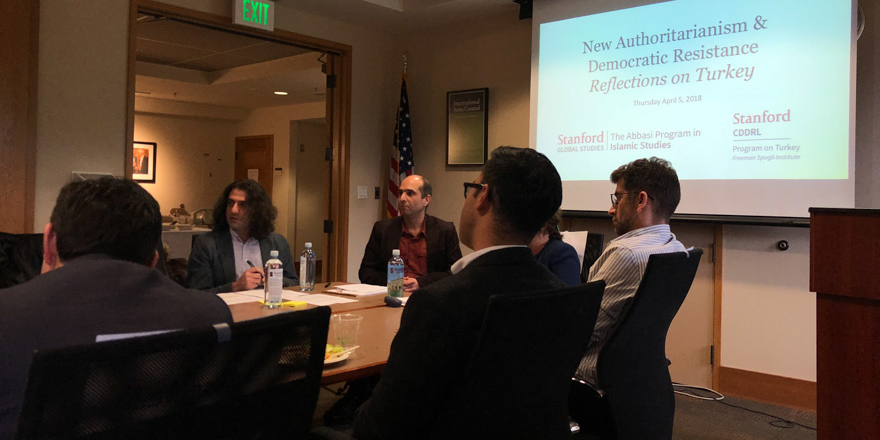In a Thursday evening panel discussion titled “New Authoritarianism & Democratic Resistance, Reflections on Turkey,” visiting Turkish academics discussed the current socio-political environment, foreign policy and future prospects of contemporary Turkey. Sponsored by The Abbasi Program in Islamic Studies and chaired by visiting postdoctoral scholar Halil Yenigun, the discussion focused on the policies and impacts of Turkish President Recep Erdogan’s consolidation of power.
Visiting Armenian studies professor at Fresno State University Yektan Turkyilmaz emphasized the political implications of Erdogan’s government. According to Turkyilmaz, the current state of affairs in Turkey easily lends itself to potential humanitarian crises. Citing examples such as Erdogan’s cult of personality and paranoid socio-political psychology and conflict amongst political factions, Turkyilmaz drew parallels between Erdogan’s Turkey and Stalin’s Soviet Union, as well as Maoist China.
“The convergence of [the three reasons mentioned above] give rise to a cannibalistic state mechanism,” Turkyilmaz said. “Everyone can potentially be a target, and that’s why everyone has to fear.”
Turkyilmaz said that he saw Erdogan’s rule as causing a break in the legacy of leaders like Ataturk and Abdul Hamid II.
“Within all this fetishism [of symbols associated with Ataturk and/or Abdul Hamid II], all the institutions that these people have generated are being destroyed,” he said.
With regard to the possibility of democratic movements gaining ground, Turkyilmaz said he remains pessimistic.
“The field of opportunities [for democratic movements] is shrinking day by day,” he said. “The regime effectively contained the democratic opposition in the country.”
Former assistant professor at Bingol University and former Visiting Scholar at Pomona College Eda Erdener, who left Turkey after being targeted for signing a petition protesting actions of the Turkish government against Kurdish civilians, spoke of the social impact of increasing authoritarianism in Turkey. Particularly, she focused on the loss of progress made regarding women’s rights issues.
Erdener cited the government takeover of women’s cooperatives and consultation centers as having reversed the previous decline in rates of rape, domestic violence, polygamy, honor killings and similar issues.
“Most women don’t trust police, nor do they approach government agencies,” Erdener said. “Political violence leads to cultural trauma, and this violence is responsible for cultural disintegration, erosion of social structures, discrimination and hatred and violence against women and children.”
Erdener also mentioned cases of local militiamen raping, kidnapping and torturing individuals as well as the practice of forced child marriages.
“I’m afraid that we will see a lot more examples [of rights violations] in the coming days,” she said.
University of South California visiting international relations professor Sinan Birdal focused on foreign policy, which is being used as a tool for regime-building in Turkey. In particular, he addressed Turkey’s stance with regards to its NATO membership and the unlikelihood of forming an alliance of equals with Russia.
“Turkish foreign policy since the end of the Cold War is trying to … reestablish its strategic value in American or Western geopolitical thinking,” Birdal said. “How do we stay relevant in our relation with the U.S. so that we still get the perks?”
Birdal also addressed the mistreatment of minorities by the Turkish government.
“We need a new coalition with the Kurds and part of the Turkish opposition that can … come out against the suppression of Kurds inside and outside [the country],” he said. “Nobody really dares to [stand up for the Kurds] – not even the head of the main opposition has the guts.”
Contact Sean Chen at kxsean ‘at’ stanford.edu.
A previous version of this article misspelled Eda Erdener’s last name and misstated her professional titles. Additionally, Erdener left Turkey after being targeted for signing a petition protesting actions of the Turkish government against Kurdish civilians, not the Kurdistan Workers’ Party. The Daily regrets these errors.
